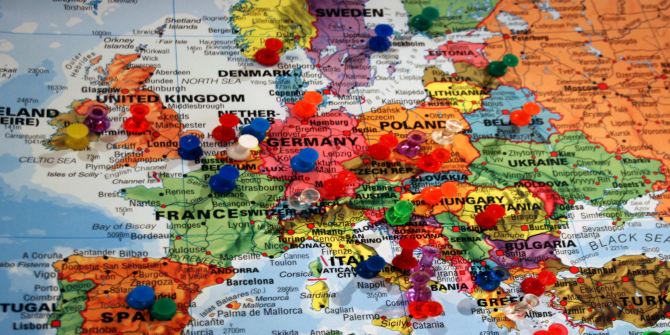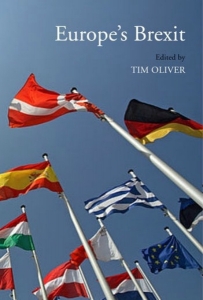In Europe’s Brexit: EU Perspectives on Britain’s Vote to Leave, editor Tim Oliver brings together contributors to refocus attention from the impact of Brexit upon the UK to instead consider the perspectives of the 27 other EU countries as well as the implications for EU institutions. This is a well-written collection that will prompt readers to better understand the desires, motivations and viewpoints of the different EU member states, finds Chris Stafford.
Europe’s Brexit: EU Perspectives on Britain’s Vote to Leave. Tim Oliver (ed.). Agenda Publishing. 2018.
For many, the result of the UK’s referendum on European Union membership came as quite a shock. This was as true for Europe’s political elite as it was for much of the general public and even many of those advocating the ‘Leave’ option. Naturally, such a monumental event and the subsequent proceedings have warranted considerable coverage and analysis, but more often than not, the majority of this has focused primarily on the UK. The causes, consequences and meanings of ‘Brexit’ are all typically looked at from a British perspective, and it is commonly assumed that this issue is just as important to the rest of Europe as it is to the UK. However, it is easy to forget that when we talk about the EU, we are not just referring to an autonomous political entity, but rather to 27 other individual countries, each with their own problems and priorities, for which continuing issues relating to both the eurozone and migrant crises render the UK’s imminent withdrawal from the EU less important than the British might like to think.
It is here that Europe’s Brexit aims to contribute, with editor Tim Oliver stating in the introduction that the focus of the book is not the UK, but the countries and the institutions that will be left behind as it separates itself from the EU. Actors more central to the issues, such as Germany, France, Ireland, Poland and the EU institutions themselves, have been given their own chapters, while other member states have had to share, being grouped by geographical proximity. This serves to reduce the overall length of the book but without significantly compromising the extent of material covered. The ‘Benelux’ nations are a good example of this, as despite not being able to give as much individual attention to each country, Rem Korteweg and his co-authors manage to analyse the three nations with the same level of depth and insight that Vivien Pertusot does in a chapter focused solely on France.
The time period covered by the book is fairly brief in duration but significant and tumultuous in nature. Aside from some relevant history, the book primarily covers the 21-month period from June 2015, when then UK Prime Minister David Cameron informed the European Council that he wished to renegotiate the country’s terms of membership, up until March 2017, when his successor, Theresa May, informed the council that Article 50 was being triggered and Britain was to formally begin the process of leaving the EU.
 Image Credit: (Caitlin Regan CC BY 2.0)
Image Credit: (Caitlin Regan CC BY 2.0)
Despite the variation in the countries covered and the numerous different authors who contributed to this work, Oliver has managed to ensure remarkable consistency throughout the book. Each country is analysed according to how they responded and acted during four defined periods: namely, Britain’s pre-referendum renegotiations; the referendum campaign itself; the result of the referendum; and, finally, the divorce negotiations after the triggering of Article 50. However, even within this common structure, the authors have been able to tailor each chapter to focus on the issues that best reflect the actions of their respective country or countries.
When discussing Mediterranean member states, for example, Eleanora Poli and her co-authors present their information quite differently to how António Raimundo and Laia Mestres do on Spain and Portugal; but the shared yet flexible structure allows each chapter to present the subject matter in a manner best suited to each case. This also allows for easy comparison between the different countries and facilitates the construction of the bigger picture, without the chapters having to constantly reference each other.
This means that as the book progresses, it is clear to see the different approaches and motivations of various member states. Nicolai von Ondarza writes that countries such as Germany initially saw renegotiations as a technical matter and assumed the UK was too pragmatic to actually leave the EU; whereas Andrew Gilmore shows that due to its own experiences with EU referendums, Ireland was much less certain of a ‘Remain’ vote and was far more willing to appease the UK up to a point, due to the close economic, political and social links between the two countries.
Nevertheless, what is also striking is just how unified the member states have been throughout the period covered in the book, maintaining a united front and refusing to compromise on key issues such as the four freedoms of the single market, making negotiations much tougher for the UK government. In addition, they have all accepted that the figureheads of the EU institutions should be the ones to speak and negotiate on behalf of everyone, which helps to explain why despite its size and diversity, the EU is often presented as a single Brussels-based entity. This is in stark contrast to the UK where disunity and constant competition within the country, and perhaps more importantly within the government itself, are constantly making headlines.
However, one potential criticism of the book is that the distinctness of each chapter, in conjunction with the common themes that run throughout it, results in most of these issues being reiterated constantly in each new contribution, with the content thus becoming quite repetitive in places. Whichever country the discussion is focused on, be it France, Germany, Malta or the Czech Republic, regular references are made to how these countries have many other pressing concerns; how in the beginning they wanted the UK to remain a member but not at any cost; and then how after the referendum their focus was primarily on moving forward without the UK rather than how to actually separate. While it is of course interesting and relevant that certain themes and beliefs are so strong that they resonate across 27 very diverse nations, anyone reading the book from cover to cover will likely grow weary of these sentiments before too long.
These oft-repeated sentiments may also grind with a reader depending on their political viewpoint. Those more sceptical of European integration may find the view of an upbeat and unified EU27 quickly putting ‘Brexit’ behind them to be a rose-tinted view of the situation on the continent. On the other hand, those less enthusiastic about the ‘Brexit’ process may see this book as containing important lessons about Britain’s position in the world, both real and perceived, and how it could have better approached its relationship with Europe over the past few years.
Regardless, this is a well-written book that states its case clearly and highlights important issues that have often been lacking from other commentary and analysis thus far. While for many readers the book will prompt them to consider what could have been done differently up until now, the book’s key concept of understanding different national perspectives will be important to remember going forward. As the UK attempts to forge its own path in the world, making a concerted effort to understand the desires, motivations and perspectives of other nations will be crucial if it wants to make the most of its newly found ‘independence’.
This blog gives the views of the author, and not the position of the LSE Brexit blog, or of the London School of Economics. It first appeared on the LSE Review of Books blog.
Chris Stafford is a PhD student at the University of Nottingham, focusing on democracy and representation. His current research investigates how MPs have reacted to the result of the EU Membership Referendum and how this relates to the opinions of their constituents. Read more by Chris Stafford.


 Find this book:
Find this book: 




Perhaps it is time for N/I to become a Protected Territory (PT)and be self fnancing.
At the moment it wants continude free movement of people and goods so give it PT and a Hard Border at its ports. It hardly contributes to our wealth and safety.ur wealth and safety at this moment in time.
I apologise for my previous posts typing and spelling errors.